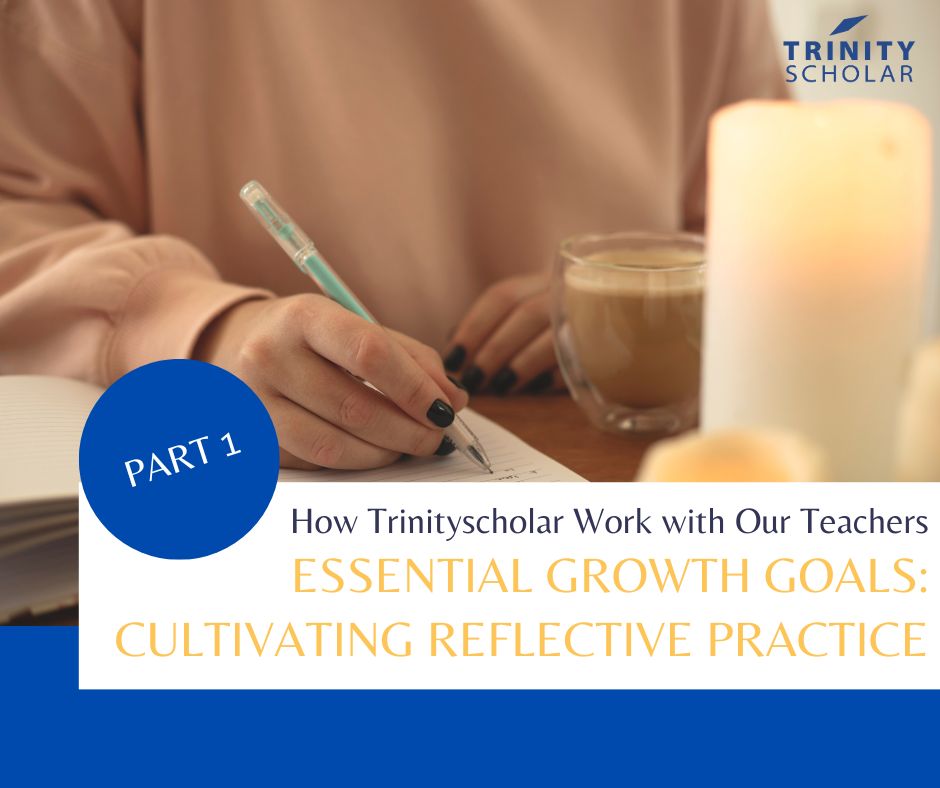Essential Growth Goals: Cultivating Reflective Practice
Part 1 of Essential Growth Goals for Trinity Scholar’s Teachers As education continually evolves, especially after the worldwide Covid-19 pandemic, teachers are tasked with the responsibility of keeping pace with the latest educational trends and methodologies. Setting growth goals are not only beneficial for personal and professional development, but also essential for fostering an enriching learning environment for students. In this 5-part article series, we’ll explore a range of growth goals that Trinity Scholar encourages teachers to encompass both foundational principles and innovative strategies. – At Trinity Scholar, we believe that reflection serves as the cornerstone of effective teaching. Our commitment to fostering excellence in education extends beyond the classroom, encouraging our teachers to engage in continuous self-assessment and introspection. Why reflective practice matters in Trinity Scholar Reflection is more than just a fleeting thought or casual observation; it is a deliberate and systematic process of examining one’s instructional practices, classroom interactions, and student outcomes. By dedicating time for introspection, teachers can gain invaluable insights into their teaching effectiveness, identify areas for growth, and make informed decisions to enhance student learning experiences. Class Notes: A Tool for Reflection One way we facilitate reflective practice is through the use of Trinity Scholar’s class notes. After each class session, our teachers are encouraged to take a few moments to jot down their observations, insights, and reflections. These notes serve as a tangible record of their teaching experiences, capturing both the successes and challenges encountered in the classroom. Refinement and Growth Reflection is not merely about identifying shortcomings; it is also about celebrating successes and leveraging strengths. Our teachers may use their reflections as a basis for growth, experimenting with new instructional approaches, and even collaborating with colleagues to enhance their teaching practice. The Impact of Student Learning Ultimately, the goal of reflective practice is to improve student learning outcomes. We utilize class notes taken by our teachers not only to identify students in need of additional support but also as a comprehensive progress chart for tracking individual student growth. These notes serve as valuable tools for communication with both parents and teachers, facilitating a transparent and collaborative approach to student assessment and support. By leveraging reflective practice in this way, we ensure that every student receives the personalized attention and assistance they need to thrive academically and beyond. Conclusion We recognize the dual purpose of reflective practice: to enhance teaching effectiveness and directly impact student learning outcomes. By leveraging class notes as a tool for student assessment, individualized support, progress tracking, and communication, we ensure that every student receives the attention and support they need to thrive academically and beyond.
0 Comments
Leave a Reply. |
Archives
July 2024
Categories
All
|
TRINITY SCHOLAR
|
Hours of Operation 營業時間:
Mon – Fri 周一到週五 10:00 – 19:00 Sat & Sun 週六與週日 9:30 – 18:00 (Off on national holidays 國定假日不營業) |
@ 2022 Trinity Scholar. All Rights Reserved.


 RSS Feed
RSS Feed